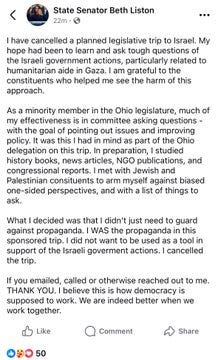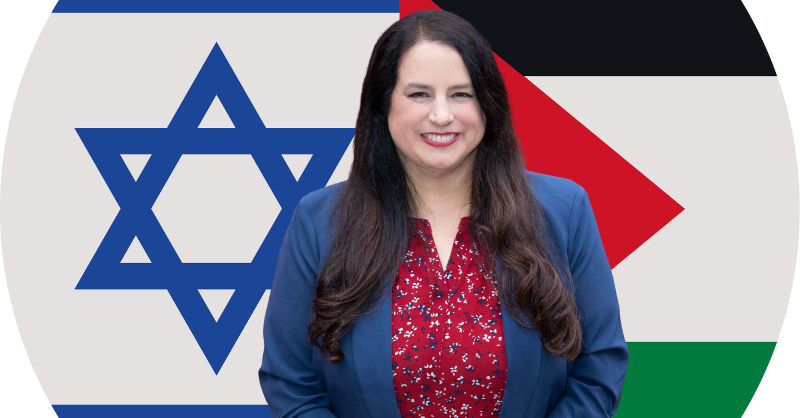Senator Liston speaks on social media firestorm over canceled trip to Israel
Beth Liston (D-Dublin) canceled a planned trip to Israel last week. "It's really about not wanting to be a part of propaganda," she said in an interview with special correspondent Max Littman.
It’s rare for politicians to listen to their own constituents. It’s also rare for politicians to be overtly transparent.
The news late last week that Doctor Senator Beth Liston (D-Dublin) canceled a trip to Israel was surprising on both of those fronts. The cancellation came in the midst of significant pressure from constituents, and the fact that she was upfront about going in the first place.
Trips by lawmakers to Israel are extremely common, whether funded by interest groups (think AIPAC) or alternative means. What’s uncommon is finding out that these trips ever even occurred.

Sen. Liston’s trip wasn’t a lobbyist trip. It was a trip funded by the Consulate of Israel and included politicians from all 50 states.
The trip included a visit to the Old City of Jerusalem, the Knesset (Israel’s Parliament Building), and a meeting/photo op with Israeli Prime Minister (and war criminal) Benjamin Netanyahu.
The Rooster sat down with Sen. Liston to discuss her thought process in cancelling her trip, hear her thoughts about the internet virality, and the response of her constituents.
The questions are in bold text with Senator Liston’s response in standard text.
This interview has been lightly edited for grammar, syntax and clarity.
The Rooster (TR): Walk me through the decision-making process, from taking the trip to what led to your decision to ultimately cancel?
I really did try to meet with people and get a lot of different perspectives before I went on this trip. I started with reading books and trying to learn the general history and the history of the Israeli-Palestinian conflict over the last 150 years.
I reached out to (local synagogue) Beth Tikvah and met with their Rabbi, Rick Kellner.
We met and talked to make sure I knew what his constituency might be interested in or concerned about. I also spoke with State Rep. Munira Abdullahi (D-Columbus) so that I could get a different perspective. My intention was to be transparent. I didn’t want this to be a trip where people looked back and said, “What?”
I also wanted to bring questions and thoughts from the people I represent.
In the days coming up to the trip, I started hearing from Muslim members of my district. They asked if it was true that I was going on it.
There was definitely a sense of betrayal that what I was doing was supporting a government that was oppressing their family members. I met with some of them and Palestinian community members.
And in that timeframe, more people kept calling in, the phone just kept ringing, and they were sending emails about the concerns they have, specifically about how these kinds of trips have been used to show that the U.S. is behind the actions of the current Israeli government and that my going there would contribute to that.
Obviously, I don’t think I’m all that important, so I was a little skeptical that there was that impact.
The ability to ask questions and bring concerns is one of my strengths, so I tried to reassure them that I could bring their questions and try to get some semblance of an answer, whether it was objective or not, and bring the perspective back to the district.
All of these things were coming together as the trip drew nearer and nearer, and the day before [the trip], I was asked [by the Israeli Consulate] to represent the group and do a tree planting in the Gaza envelope.
It just felt so off.
Having heard from so many people for whom this conflict was so raw and personal, and knowing all of the suffering in Gaza, and in the Jewish community with the hostages, going and planting a tree and taking pictures was the straw that broke the camel’s back. I couldn’t be doing photo ops in the Gaza envelope when so many in my district felt this personally.
Friday afternoon (the trip was to start Saturday) I simply decided I couldn’t go, I had my office email the consulate and tell them that I couldn’t attend and then I started sharing with the people who reached out that I wasn’t going.
TR: Were you surprised by the social media reaction to your trip cancellation announcement, especially with it going so viral?
I didn’t expect it to go viral.
I knew there were a lot of people who really reacted when they heard about the trip.
I know it’s a sensitive situation, so I put it on social media because I really wanted to share with people that I wasn’t going to go. I wanted people to know that their advocacy mattered. That, as their representative, I wasn’t just ignoring it.
That was my intent with posting it on a public forum; I very much underestimated what it would look like. I didn’t expect 3 million impressions from a [Twitter] post. I’ve never had that many responses.
Some of it was positive in that people understood the challenge of propaganda in this complicated conflict and there were a lot of those that were thankful and supportive. In the [Twitter] space, I was concerned, and am concerned, that people will use this as a narrative to attack Jewish people.
I want to make sure that’s not a narrative that comes from this. This isn’t about not wanting the hostages returned or not condemning the Hamas attack. It’s really about not wanting to be part of a propaganda campaign by a government that isn’t, to my eyes, acting ethically.
TR: I know you mentioned that you were planning on asking some questions while on the trip, can you share any of those questions?
I was going through the congressional report on humanitarian aid and trying to pick out questions.
I wanted to ask about medical availability since so many hospitals have been destroyed. And I wanted to ask about water access and why that is such an issue and why people don’t have free access to water.
That’s the type of question I was starting with, and I wanted to pull out more to ask directly from that.
TR: What would you say to Jewish groups who might question this decision and what that means about your support of them?
I realize that Jewish people have a real reason for fear, and antisemitism in this country and across the world has led to atrocities that are still in the hearts of Jewish people now.
This decision was not about security for Jewish people; it was about a right-wing government that is involved in a conflict that has led to a humanitarian crisis. The whole conflict is really complicated, but you can support people and question the government's actions.
I do that in this country all the time. I can support Americans and support groups of people, and question what our government is doing.
I don’t want to be in a position where I’m tacitly endorsing actions that lead to suffering. Going on a trip that endorses one side of this conflict felt wrong.
TR: What has the response been like from constituents after they found out that you weren’t going?
I think that there are some in the Jewish community who are concerned that I was doing this because I don’t support Jewish constituents.
That was a minority. Some Jewish constituents have reached out that they’re concerned about how the conflict is being handled and concerned about the trip meeting with Netanyahu as well.
The Muslim community has been so grateful; people told me they started crying when they heard I wasn’t going. Other concerned citizens reached out and said that they felt amazed and hopeful because a representative had listened.
And not only just listened and said that they’d been heard and made a decision, because I made a decision in response to constituent outpouring which was considered so rare that it is heartbreaking.
TR: Are there any lessons that you’re taking out of this? From the constituent pushback or the social media?
I think that maybe the lesson is to try to be upfront from the beginning about what you’re doing and your thought process.
There were many people I should’ve spoken with before.
I didn't want to hide the trip, and when I knew it caused strong feelings, I wanted to bring it forward. I think people had the opportunity to reach out, and it mattered to them a lot.
If we can all try to do that more, it’s hard to have difficult conversations with people who may disagree with what you’re thinking about doing.
But I learned a lot about the conflict, the history, how people felt and viewed both the Israeli-Palestinian conflict and their ability to impact change. People really didn’t think that they could [impact change], which is heartbreaking when this really is a small action.
I think the misinformation I might have brought could have harmed the Jewish diaspora broadly; they would have had a skewed view of the politics of the United States.
I only represent my district, and if I were there, and it indicated support, that would contribute to misinformation, which I think hurts everyone.
I didn’t fully anticipate the positive that I’ve experienced from people feeling like they have a voice. I underestimated how disempowered people feel right now. It’s very touching when people are so grateful for something so small. I think that will stick with me.
TR: Now that you have this week free, are you doing anything you otherwise wouldn’t have?
I’m planning on attending a Holocaust survivor event on Wednesday with Rep. Christine Cockley (D-Hilltop). I have more opportunities to do things here, which is better anyway.
Final judgement
Sen. Liston should be applauded for listening to her constituents and not taking a propaganda trip to Israel. It’s far too often that politicians ignore constituents in these instances.
By canceling the trip, Liston drew a line in the sand.
It’s particularly interesting that she refused to be in a photo opportunity in or near Gaza. Those photo ops are heinous, and she was absolutely correct that it would do nothing but cause harm in her district.
At the same time, I think it’s also an instructive look at how pervasive foreign lobbying, particularly Israeli foreign lobbying, is in the U.S.
There is no need for a State Senator or State Representative to visit Israel, on top of, of course, the ongoing genocide of Palestinians; their work fundamentally should have no impact on Israel.
The fact that the Israeli government is sending 250 state legislators to meet with their Prime Minister, and to do photo ops, is beyond bleak. It's disgusting.
It’s a positive development that an outcry stopped this trip, and that Sen. Liston absolutely listened to the critiques of it.
As a Jewish constituent of hers I also cannot emphasize how much this decision has nothing to do with her support of the Jewish community or fighting anti-semitism.
Those are both things that are done at home, and have nothing to do with the State of Israel.
Israel continuously claiming itself as the voice of world Jewry, in the face of horrific crimes against Palestinians, does nothing but increase anti-Semitism at home.
Canceling the trip and supporting Jews and Muslims in the district is far more important, and I’m glad that’s happening instead.
THOSE WMDs. The secret Russian life of Europe’s most notorious fugitive-turned-spy… Why one of the world’s most brilliant AI scientists left the United States for China… Inside the twisted world of a romance scammer… My wife and I had couples therapy on television, and it almost wrecked our marriage… Are you mom enough to stay home?



Who did go to Israel?
This is so well done. 👏🏻